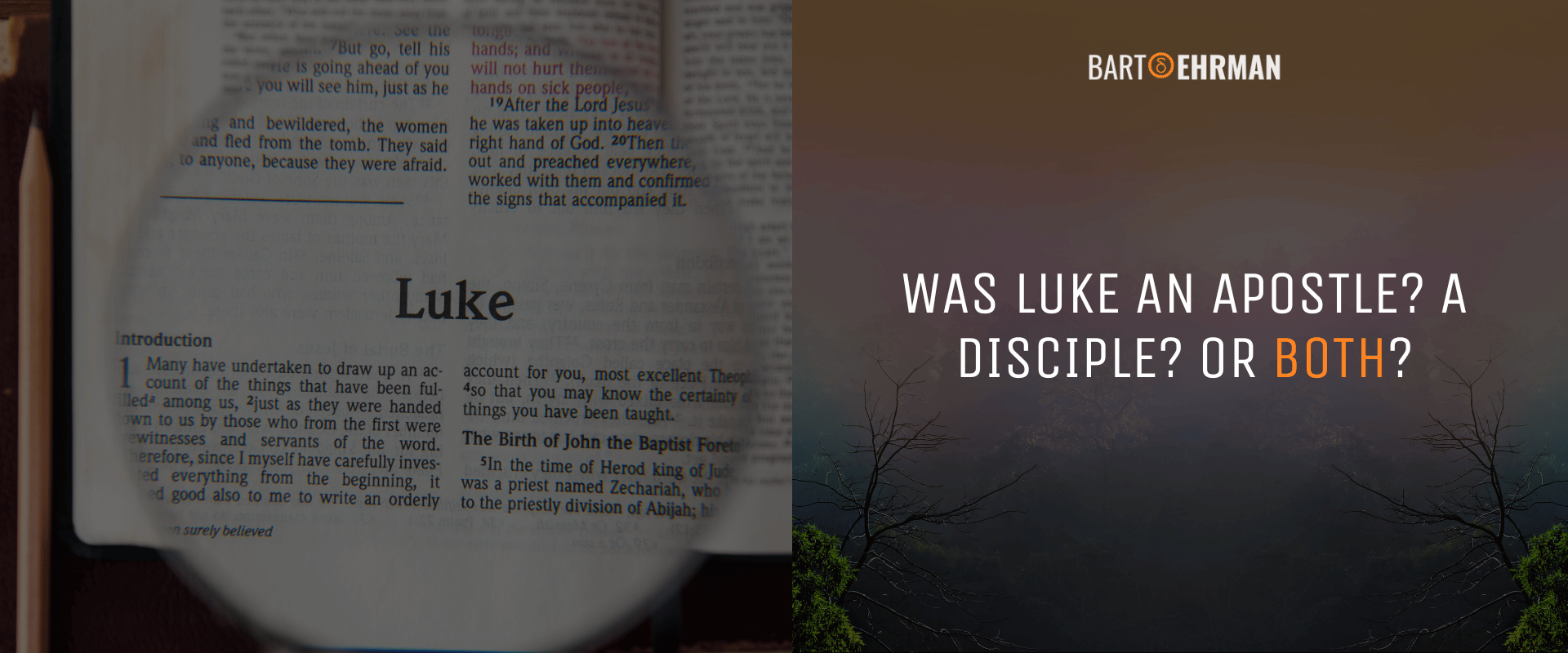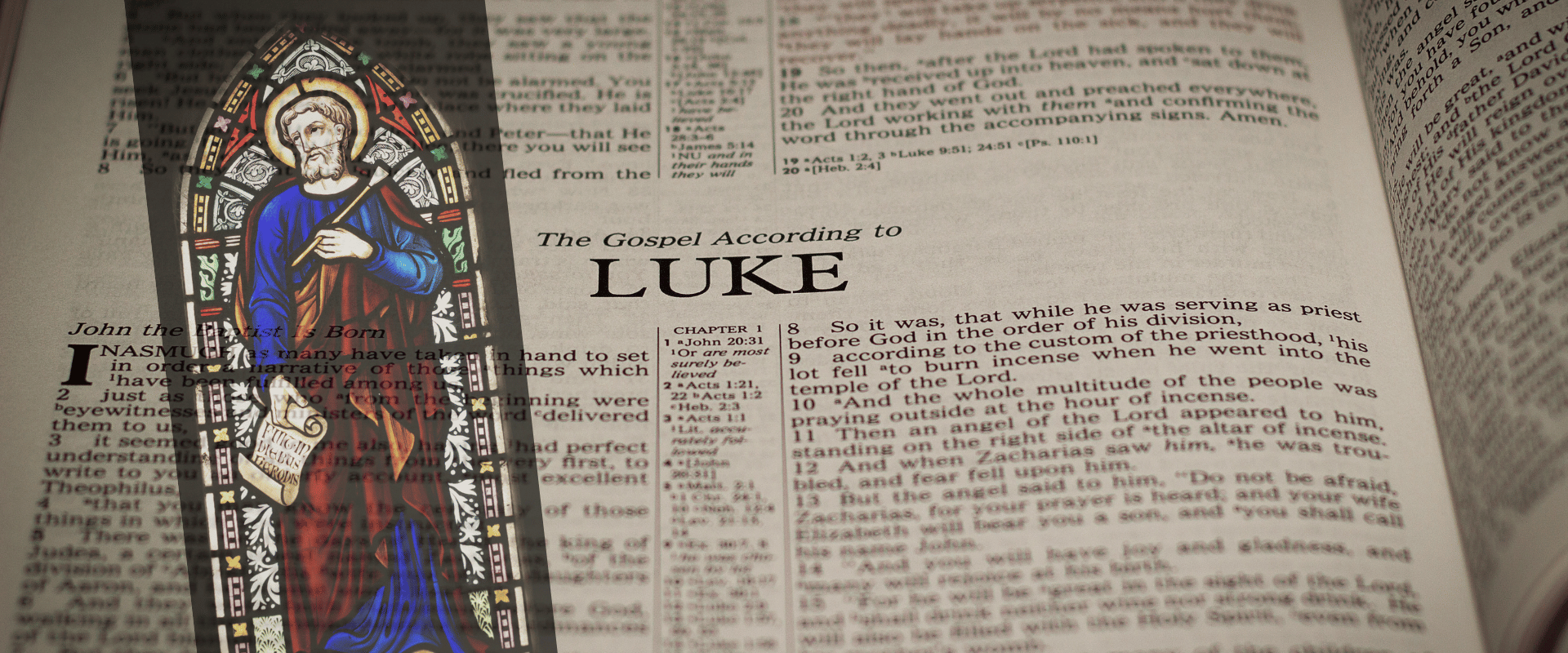Was Luke an Apostle? A Disciple? Or Both?

Written by Marko Marina, Ph.D.
Author | Historian
Author | Historian | BE Contributor
Verified! See our guidelines
Verified! See our editorial guidelines
Date written: October 8th, 2024
Edited by Laura Robinson, Ph.D.
Disclaimer: The views and opinions expressed in this article belong to the author and do not necessarily match my own. - Dr. Bart D. Ehrman
Today, most books provide a brief biography of the author, giving readers a glimpse into who they are before they even turn the first page. When it comes to scholarly works, knowing the author’s background can greatly influence a reader’s decision to invest time in the material.
In the ancient world, however, things were far more complicated. Books didn’t come with dust jackets or author bios. In many cases, they were written anonymously, leaving modern scholars with the challenge of identifying the author through the text itself.
This brings us to the Gospel of Luke. Traditionally, Luke is thought to be the author of both the Gospel that bears his name and the Acts of the Apostles, but as with many things in early Christian history, this is not as straightforward as it might seem. Was Luke really the author? More importantly, who was Luke? And perhaps the most intriguing question: Was Luke an apostle, a disciple, or something else entirely?
Answering these questions involves more than just historical curiosity — it touches on our understanding of the origins of the New Testament and the very nature of the early Christian world. In this article, we’ll explore what we can know about the author of Luke’s Gospel, and in doing so, we’ll also consider whether he was truly an apostle, a disciple, or neither.
Before diving into these questions, however, it’s important to clarify the terms that are central to our discussion. First, we’ll define two key terms in early Christianity: “apostle” and “disciple,” both of which carry significant weight in understanding Luke’s possible role.

Apostle vs. Disciple: Clarifying Terms and Definitions
Explaining the terms “apostle” and “disciple” within the context of early Christianity presents several challenges, as these terms weren’t consistently defined across New Testament texts. Their meanings were highly situational and often depended on the specific passage or author.
While some books of the New Testament provide relatively clear distinctions, others blur the lines between the two.
For example, the Gospel of Luke merges the roles of disciples and apostles more fluidly, whereas Paul uses the term “apostle” in a broader sense to describe those with a divine commission, including Barnabas. To understand the potential status of the author of Luke’s Gospel, it's essential to clarify these terms and explore their nuances.
The term “apostle” (“ἀπόστολος” in Greek) originates from the verb “ἀποστέλλω,” meaning “to send forth.” William R. Schoedel notes that this term is “attested only infrequently in Greek literature, referring to an envoy or a bearer of a message in a general sense (e.g. Herodotus, 1.21.).”
(Affiliate Disclaimer: We may earn commissions on products you purchase through this page at no additional cost to you. Thank you for supporting our site!)
In the New Testament, however, this meaning evolves. While “apostle” retains the sense of being sent on a mission, it becomes more specialized. In Acts 1:21-22, for example, the requirements for apostleship are strict: an apostle must have been an eyewitness to Jesus' ministry from the time of John’s baptism until the resurrection.
The term “disciple” (“μαθητής” in Greek), on the other hand, carries a broader and less formalized meaning. A disciple is essentially a learner or follower, one who commits to a teacher and their teachings.
In Jesus' case, the disciples were those who followed him during his earthly ministry, learning from his actions and words. However, even this term had layers of meaning.
By the time the title “apostle” was applied to certain disciples, particularly those who had witnessed the resurrection, a distinction began to emerge. The author of Luke’s Gospel, for instance, equates Jesus’ disciples with the apostles, specifically identifying the Twelve as a core group who also functioned as leaders of the early church in Jerusalem.
This identification of the Twelve with apostles is significant because it highlights their elevated role within the early Christian movement, though not all disciples were considered apostles.
The Twelve Apostles are a key focus in the Gospel of Luke, where they are described as the group handpicked by Jesus during his public ministry. They formed his closest circle and were entrusted with special responsibilities.
As John P. Meier emphasizes, apostles weren’t just followers but individuals that Jesus chose to be part of an inner circle that would carry on his message after his death.
However, the broader category of “disciple” included many others, both men and women, who followed Jesus' teachings and formed what could be described as a "middle circle" around him. These disciples were dedicated to physically following Jesus and often left behind their homes, possessions, and families to join his itinerant ministry.
Thus, while all apostles were disciples, not all disciples were apostles. The apostles were distinguished by their specific calling and their role as direct witnesses to Jesus’ life and ministry.
Furthermore, by the time of Luke’s Gospel, the term “apostle” carried a leadership function that set these parties apart from the broader group of disciples. They also played an important role in spreading Jesus’ teachings but didn’t hold the same authoritative position.
The distinction is crucial for understanding how someone like the author of the Gospel of Luke attributed to him, may or may not have fit into either category.
Luke in the New Testament: Traditional Attribution
The Gospel of Luke, like the other canonical Gospels, is technically anonymous. Nowhere in the text does the author identify himself.
This wasn’t an uncommon practice in the Greco-Roman literary world. A famous example comes from the Roman historian Tacitus, who, despite his prominence, doesn’t always explicitly name himself in his works.
In the case of the Gospel of Luke, it wasn’t until later that early Church tradition attributed this Gospel to Luke, a traveling companion of the apostle Paul.
The earliest explicit references to Luke as the author come from the Muratorian Canon (circa 170 CE) and Irenaeus of Lyons, writing around the same time. Irenaeus, in his “Adversus Haereses” (“Against the Heresies” (3.1.1), identifies Luke as “Paul’s follower,” claiming that he compiled the teachings of Paul into the Gospel.
Moreover, the earliest manuscript titles come from the 3rd and 4th centuries, and their form “κατὰ Λουκᾶν” (“According to Luke”) suggests that they were added later by scribes who were copying the Gospels.
The title was likely added only after multiple Gospels began circulating. This was a pragmatic measure to distinguish Luke’s Gospel from others such as those attributed to Matthew, Peter, Mark, and John. Thus, the traditional attribution of the Gospel to Luke arose out of the need to identify and differentiate the various Gospels, decades after the text was originally written.
Consequently, many critical scholars reject the traditional attribution of Luke’s Gospel to Paul’s companion.
As Bart D. Ehrman observes in Jesus: Apocalyptic Prophet of the New Millennium, “The New Testament Gospels were written anonymously. The authors didn’t attach their names to their work. Possibly they thought their names were relatively unimportant.”
However, for the sake of convenience and continuity, we’ll refer to the author of the Gospel as "Luke" throughout this article. So, who exactly was Luke, the person traditionally associated with this Gospel?
In the New Testament, Luke is mentioned a few times in letters traditionally attributed to Paul. He appears in Colossians 4:14, where the author refers to him as “the beloved physician,” in Philemon 24, where he is mentioned among Paul’s fellow workers, and in 2 Timothy 4:11, where the author writes that "only Luke is with me" during his imprisonment.
These references paint a picture of Luke as a loyal companion to Paul, possibly serving as his physician, though this is inferred rather than explicitly stated. Early Christian tradition suggests Luke may have been a Gentile convert, a point we’ll discuss in the next section.
With this in mind, we must now take a step back and explore what we can culturally and historically know about the real author of the Gospel of Luke. Was “Luke” an apostle, a disciple, or neither?
FREE COURSE!
WHY I AM NOT A CHRISTIAN
Raw, honest, and enlightening. Bart's story of why he deconverted from the Christian faith.
Over 6,000 enrolled!
Was Luke an Apostle? Analysis of His Cultural Background
The cultural background of the author of the Gospel of Luke, traditionally known as “Luke the Evangelist,” has been a subject of scholarly debate for years. Some scholars argue that Luke was a Jewish convert to Christianity, while others believe he was a Gentile Christian with significant exposure to (Hellenized) Jewish culture.
In his Introduction to the New Testament, Werner G. Kummel asserts what has been a standard scholarly view for the majority of the last century: “The only thing that can be said with certainty about the author, based on Luke, is that he was a Gentile Christian.”
Scholarly Insights
Was Luke Really a Physician?
The early church tradition that identifies Luke as “the beloved physician” mentioned in Colossians 4:14 has long fueled the debate over whether the author of Luke-Acts was a medical professional. In the late 19th century, W.K. Hobart argued that Luke’s Gospel and Acts display numerous medical terms that could suggest the author was indeed a physician.
However, modern scholars, including Michael Wolter, have cast doubt on this theory. Wolter notes that most of the terms Hobart identified are not unique to medical literature but are part of general vocabulary found in other ancient authors who were not physicians.
Furthermore, Wolter highlights the work of scholars such as H.J. Cadbury and Werner G. Kümmel, who argue that Luke’s language doesn’t demonstrate a specific medical interest or expertise. Instead, Luke's usage of technical terms, whether medical or legal, reflects a broader attempt to maintain professional accuracy across different fields.
As Wolter concludes, attributing medical knowledge to Luke based solely on linguistic evidence in the text isn’t convincing. Consequently, the question of Luke’s profession is open for continued debate.
With less certainty but with the same outcome, Stephen Harris concludes: “Because of his interest in a Gentile audience and his ease in handling the Greek language (he has the largest vocabulary and most polished style of any Evangelist), the writer may have been a Gentile.”
However, during the last several decades, scholars came to question the certainty of Luke’s Gentile background.
So, for instance, Michael Wolter, in his Commentary on the Gospel of Luke, leans toward the view that Luke had an unmistakably Jewish cultural profile. He notes that Luke's familiarity with Jewish scriptures, customs, and idioms, along with his precise portrayals of groups such as the Pharisees and Sadducees, suggests that Luke had more than just superficial knowledge of Judaism.
Wolter argues that this level of engagement with Jewish tradition indicates that Luke may have been a Jewish convert or someone deeply embedded in a Jewish-influenced milieu. He concludes that “the author of the Gospel of Luke grew up in a Jewish family and, like Paul, experienced not only his primary but also his secondary socialization in a Jewish milieu.”
Moreover, Joseph A. Fitzmyer, in his Commentary on Luke, offers a slightly more nuanced view. He believes that Luke wasn’t of Jewish origin but rather a non-Jewish Semite, possibly a native of Antioch. According to Fitzmyer, Luke was “well educated in a Hellenistic atmosphere and culture,” which explains the sophisticated Greek style of his writings.
The divide in scholarly opinion stems from the fact that Luke’s writings reflect a blend of Jewish and Hellenistic elements. On the one hand, his use of the Septuagint and his detailed understanding of Jewish traditions align with the idea that he could have been a Jewish convert.
On the other hand, his Hellenistic literary style and his apparent comfort in engaging with Gentile audiences suggest he may have been a Gentile Christian. Additionally, the early Christian tradition that places Luke in Antioch, a cosmopolitan city with a strong Jewish community, further complicates the picture.
Perhaps, the most scholarly way would be to align with Mark A. Powell's somewhat unsatisfactory conclusion: “Scholars have debated whether he is a Hellenistic Jew who received a classical education or a Gentile whose embrace of the Christian faith led to intense biblical study; the evidence can be read either way.”
Beyond the question of Luke’s cultural background lies the issue of whether he was an apostle or a disciple — questions central to understanding his place in early Christianity. Was Luke an apostle?
The prologue of Luke (Luke 1:1-4) provides a significant clue. In the opening verses, the author clearly states that his knowledge of Jesus’ life and ministry came from second or even third-hand sources.
He was not an eyewitness to the events he narrates but rather someone who investigated the reports passed down from others. This explicit acknowledgment makes it clear that Luke wasn't an apostle.
Measuring the issue by the standards of Luke-Acts, apostles were those who had accompanied Jesus during his ministry and witnessed his resurrection firsthand — a qualification Luke clearly doesn’t meet.
Was Luke a disciple? Again, the evidence suggests otherwise. In his writings, Luke never describes himself as a follower of Jesus during his earthly ministry. According to Meier’s definition of a disciple — someone who left behind home, family, and livelihood to follow Jesus physically — Luke doesn’t qualify.
He appears to have been a second or third-generation Christian, possibly a convert through the missionary efforts of Jesus’ earliest followers.

Conclusion
In conclusion, the question "Was Luke an apostle?" must be answered with a firm no, based on both the internal evidence of the Gospel of Luke and the wider historical and cultural context. Luke, as the prologue of his Gospel suggests, wasn’t an eyewitness to Jesus' ministry, nor did he meet the strict criteria for apostleship outlined in Acts 1:21-22.
Moreover, Luke doesn’t qualify as a disciple either, as he did not physically follow Jesus during his lifetime, a defining feature of discipleship as understood in the early Christian tradition.
Instead, Luke the Evangelist stands as a key figure in early Christian literature. He was a later follower of Jesus. His work was distinguished by its sophisticated blend of Hellenistic and Jewish influences and his second-hand account of Jesus’ life has left an indelible mark on the way we understand the life and teachings of Jesus.
For a deeper exploration of how scholars critically examine the Gospels, including Luke, check out “The Unknown Gospels: Matthew, Mark, Luke, and John”, an online course by Dr. Bart D. Ehrman. In this 8-lecture series, Dr. Ehrman delves into the intersection of history and myth, offering fresh insights into the origins of these foundational texts.
FREE COURSE!
WHY I AM NOT A CHRISTIAN
Raw, honest, and enlightening. Bart's story of why he deconverted from the Christian faith.
Over 6,000 enrolled!

